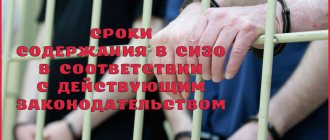A bill to reset the period of detention in a pre-trial detention center was introduced to the State Duma in June 2008. One of its authors was Tatyana Moskalkova, who now holds the post of Commissioner for Human Rights. “In accordance with the legislation of the Russian Federation, the conditions of detention of suspects and accused of committing crimes correspond to the strictest in terms of isolation, approximately the same as in prisons,” says the explanatory note to the bill. The authors of the document even cited decisions of the European Court of Human Rights, which indicated that conditions of detention should not be stricter than the conditions of the punishment imposed by the court. Therefore, it was proposed to change the existing procedure, when a day in a pre-trial detention center is equivalent to a day in a colony.
“What does this mean: that a person, while in a pre-trial detention center, endured more difficult conditions of detention than he should have endured, taking into account what the court handed down to him. Long visits are not allowed in a pre-trial detention center, a person is not allowed to work, and, of course, the difference between being in a pre-trial detention center and in a colony-settlement, where relatives can come, where a person can earn money, pay off debt, alimony, is completely different,” Moskalkova explained to Mediazone » the need to adopt a bill.
A day in a pre-trial detention center and a colony settlement: how to count?
The scheme for counting time spent in a pre-trial detention center depends only on what type of correctional institution the court assigns when imposing a sentence of imprisonment.
The most “preferential conditions” by law are provided to those convicts who are sent from the walls of the isolation ward to serve their sentences in a penal colony . In accordance with Part 3.1 of Article 72 of the Criminal Code of the Russian Federation, one day in a pre-trial detention center will be counted as two days of imprisonment .
The logic of the “preferential” credit for time spent in a pre-trial detention center is that in a detention center, which is essentially a closed prison, a person is in harsher and more cramped conditions than in a colony-settlement.
In practice, there were cases when citizens whose investigation and trial lasted for many months and even years, thanks to this law, were released without having time to get to the colony.
But there are exceptions
After the first reading, a list of articles of the Criminal Code was added to the bill, for which the term, regardless of the regime of the colony, will be taken into account at a one-to-one ratio: terrorism (205–205.5 of the Criminal Code), hostage-taking (parts 3 and 4 of Article 206 of the Criminal Code), aircraft hijacking , ship or train (Part 4 of Article 211 of the Criminal Code), treason (275 of the Criminal Code), espionage (276 of the Criminal Code), international terrorism (361 of the Criminal Code). In addition, under articles on encroachment on the life of an official or public figure (277 Criminal Code), seizure of power (278 Criminal Code), armed rebellion (279 Criminal Code) and attack on persons under international protection (360 Criminal Code), the “one to one” rule will apply if these crimes are “related to the implementation of terrorist activities.”
There will also be no conversion of sentences for those convicted under articles on possession of drugs on a large and especially large scale (parts 2 and 3 of Article 228), production and sale (228.1 of the Criminal Code) and theft of drugs (229 of the Criminal Code).
In addition, a day in a pre-trial detention center will be counted as one day of the assigned sentence for “particularly dangerous recidivism of crimes” and for convicts whose death penalty was commuted to life or 25 years in prison.
If, after being sent to a colony, the convict was placed in a punishment cell or disciplinary cell (or a cell-type facility), then the days of such punishment will also be recalculated “one to one.” Based on the text of the bill, this means an increase in the total term of punishment if a punishment is applied to the convicted person (days in the pre-trial detention center will be “subtracted” from the term counted after the pre-trial detention center). How this measure will be applied in practice was not explained during the discussion of the document in the State Duma.
Enrollment of a pre-trial detention center during a sentence in a general regime penal colony
For those who go to serve a sentence in a general regime , the time spent in a pre-trial detention center is counted as a day and a half . The situation is similar with minors who will serve their sentences in educational colonies.
Example: a citizen is sentenced to 5 years of imprisonment in a general regime penal colony. At the time of his transfer to the colony, he spent 12 months in a pre-trial detention center. Thus, his actual time served is already 1 year 6 months
The decision to count the length of stay in a pre-trial detention center is made by the court when passing a sentence.
Official website of the Supreme Court of the Russian Federation
The Judicial Collegium for Civil Cases of the Supreme Court of the Russian Federation made important calculations when it studied a citizen’s demands for compensation for his moral suffering for illegal criminal prosecution.
A resident of St. Petersburg was arrested, accused of a serious criminal offense and placed in a cell in a pre-trial detention center.
Three years and two months later, the cell doors were opened and the citizen was released with the words: sorry, man, there was a mistake.
The court recognized the person's right to rehabilitation. And yesterday’s suspect went to court with a claim for compensation for moral damage. The district court agreed that the citizen had suffered unlawfully and had the right to compensation, but the amount he requested of two million three hundred thousand rubles did not suit the judge, and he cut it very much.
The higher authority agreed with this colleague’s calculation.
But the plaintiff himself did not agree to anything less.
He appealed to the Supreme Court, which considered his arguments and justification for the requested amount worthy of attention. Result - the Supreme Court itself counted the money for illegal criminal prosecution and ordered them to pay yesterday's prisoner as much as he asked. Let us emphasize that such decisions of the Supreme Court of the Russian Federation - to make a verdict on its own - are extremely rare for the high court to make.
In the district court yesterday, the prisoner, naming the amount of compensation, calculated it as follows: he must be paid two thousand rubles for each day spent on a bunk in custody. But the district court had a different calculation - 150 thousand rubles would be enough for the plaintiff for the entire period. And not a penny more. The appeal did not object to the counting of its colleagues. But the Supreme Court of the Russian Federation did not agree with this calculation.
The person suffered moral suffering, according to the district court, because he “could not visit relatives who needed care.” But the prisoner’s arguments that during the years of imprisonment in a pre-trial detention center he lost social connections, could not start a family, since he was in isolation, were dismissed by the court - in his opinion, there is no evidence.
The Supreme Court saw the following in this dispute - according to the Constitution (Article 53), everyone has the right to compensation by the state for damage caused by the actions or inaction of public authorities or their officials.
Article 1100 of the Civil Code also talks about compensation for illegal stay in a cell.
Plus, Article 151 of the same Civil Code of the Russian Federation speaks about compensation for moral damage. This article states that when determining the amount of compensation for moral damage, the court takes into account the degree of physical and moral suffering.
The Supreme Court of the Russian Federation also recalled that there was a special plenum of the Supreme Court of the Russian Federation on compensation for moral damage to citizens (No. 10 of December 20, 1994). It explained what exactly the amount of such compensation depends on and what it does not depend on.
The High Court reminded its colleagues that our country is a party to the Convention for the Protection of Human Rights. We ratified it. The Human Rights Convention states that everyone has the right to respect for his private and family life, home and correspondence. By the way, the Convention clearly describes what is meant by the concept of “family life” - this is not only the relationship between spouses, but also the relationship of a citizen with his children and with his parents.
According to the Judicial Collegium for Civil Cases of the Supreme Court of the Russian Federation, local courts did not even remember the Convention for the Protection of Human Rights and did not remember the clarifications of the plenum of the Supreme Court.
The plaintiff, as the Judicial Panel saw from the case materials, maintained close family relationships with his parents. He helped them financially, since they were disabled and needed help.
Naturally, due to the illegal accusation, he was deprived of the opportunity to help his elders for a long time. The citizen also has a dependent son, a student. The Supreme Court emphasized that the father, who was put in a cell, could not take care of his son and communicate with him. Moreover, as the high court stated, for a long time.
These circumstances, in the opinion of the Judicial Collegium for Civil Cases of the Supreme Court, do not give rise to doubt, and they had to be taken into account when deciding the amount of compensation for moral damage. But local courts ignored this.
The courts limited themselves to the judgment that yesterday’s prisoner suffered moral suffering only from the inability to visit relatives who needed constant care. All other circumstances were not taken into account. Although the Plenum of the Plenum of the Supreme Court of the Russian Federation listed what moral experiences consist of: the inability to continue an active social life, the disclosure of family and medical secrets, and suffer from the dissemination of defamatory information. Restriction or deprivation of any rights is also added here. In general, the list of everything that definitely brings moral torment and suffering to a citizen is quite large.
The Supreme Court emphasized that the plaintiff’s demands were absolutely clearly motivated. But for some reason the courts did not take them into account. They also did not notice that the plaintiff had never been brought to justice before, was a respectable member of society, and worked. For such a person, a cell in a pre-trial detention center and serious charges of a crime were “a significant psychologically traumatic factor.”
Local courts, according to the Supreme Court, did not even remember the Convention for the Protection of Human Rights
The plaintiff, in his application to the court, cited cases of Russians considered by the European Court of Human Rights as examples of payments of certain amounts. All the cases he listed are similar to his case. They talked about compensation for those illegally accused.
In his claim, our hero indicated how much the European Court awarded each applicant. The Supreme Court of the Russian Federation emphasized, “it was precisely taking into account the established practice of the European Court of Human Rights that the plaintiff asked to recover compensation at the rate of 2 thousand rubles per day of detention.” But the local courts decided that it was enough for yesterday’s prisoner to pay 132 rubles for every day of arrest.
Such a paltry sum for 38 months in custody was “manifestly unfair,” the high court said.
The Supreme Court of the Russian Federation overturned all decisions of local courts and ordered the plaintiff to pay exactly what he asked for. Text: Natalya Kozlova Rossiyskaya Gazeta - Federal Issue No. 7682 (219)
How does a pre-trial detention center count toward a maximum security sentence?
For those who hope for a preferential credit for time in a pre-trial detention center when sent to a strict or special regime penal colony, we do not have the most optimistic news.
In accordance with Part 3.1 of Article 72 of the Criminal Code of the Russian Federation, the period of stay in a pre-trial detention center is counted towards the term of serving a sentence under strict and special regime day-by-day basis .
Many lawyers consider this state of affairs not very fair, however, this is the current law.
If you have questions for a lawyer about a specific situation, contact the online consultant on our website. It's free. Questions are accepted at any time of the day, seven days a week
Additional Weapons
The decision on release for the re-credited period will be made by the court, the author of the bill assumes: the court will be obliged to request from the institution information about the penalties of the convicted person, and in the absence of them, make a decision on release, explains Krasheninnikov.
“We now have a complete equalization - whether it’s house arrest or a pre-trial detention center, and it doesn’t matter what kind of regime a person received. But I was in different institutions - these are completely different conditions, different lives, different ecology in the literal and figurative sense. Taking into account the fact that in our large cities half of the pre-trial detention centers were built even before the revolution, it is simply impossible to be there, especially in the summer,” Krasheninnikov commented.
The initiative is especially important for business, the parliamentarian is convinced: “We know that arrest is actually a punishment before a sentence, and such a punishment allows you to extract any testimony. Unscrupulous law enforcement officers, of course, take advantage of this.”
“The bill is truncated and, moreover, disregards the position of the Constitutional Court on house arrest. The Constitutional Court has said more than once that house arrest is an exceptional measure, the same in importance as custody. People who have been under house arrest will confirm that the difference is only in the conditions, and both psychologically and physically it is all very difficult. In any case, you lose social connections and business, and in the end it turns out that you spent a year under house arrest and that turned into just six months in prison,” Alexey Fedyarov, head of the legal department of the Sitting Rus' organization, told RBC.
According to him, the amendments could turn into an “additional weapon” and become a “repressive measure” against businessmen, for whom they often try to choose house arrest as a preventive measure: “A person will understand that in a pre-trial detention center he was at least day after day going towards strict regime."








